Did you know that there are nearly two billion websites online as of September 2022?
If you’re an online business just starting or are an established business trying to improve your reach, that number may feel particularly daunting. The phrase, “there are plenty of fish in the sea,” may be comforting in the dating pool, but it’s a little less great when competing with other websites on the internet.
The good news is that, like dating, there are good and bad fish out there, and not everyone will be your competition. A clownfish doesn’t have to worry about a goldfish because one lives in the ocean, and one likely inhabits a tank in your living room.
Get it?
Let’s reel away from the fish analogy now.
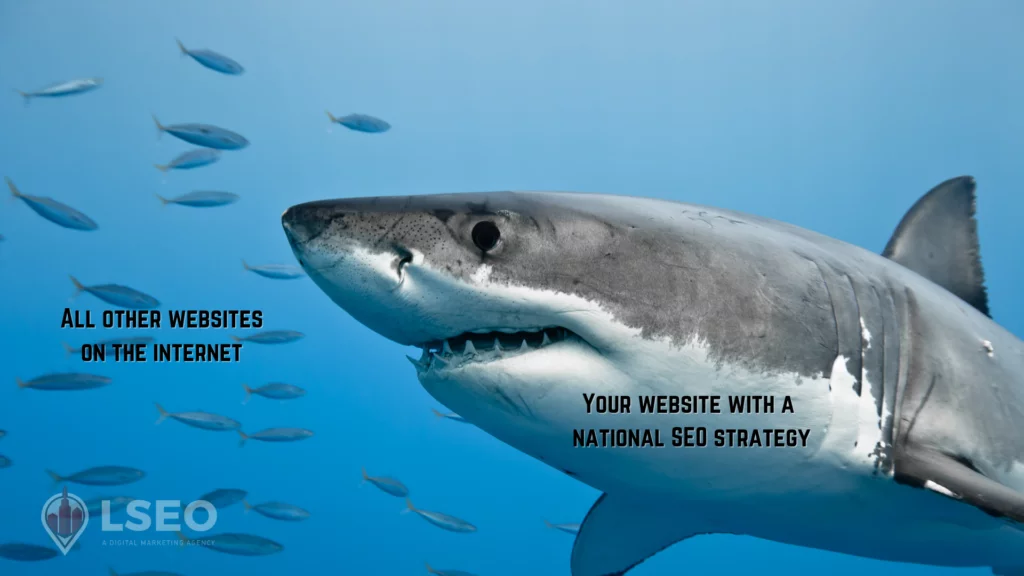
Search engine optimization allows us to cater to our target audience, so we don’t have to worry about all two billion websites on the internet and every person conducting a Google search.
Instead, we want to target a select group of people and their search queries.
For example, if you own a grooming business in Pasadena and I own a bookstore in Philadelphia, we’re not competing with each other, and neither are our websites. We’re not targeting the same audience.
For both the grooming shop and the bookstore, these fictitious examples will want to focus on a local SEO strategy because they are brick-and-mortar businesses with a local audience. A poodle owner in Philadelphia won’t be interested in booking a grooming appointment in Pasadena.
But what about when your business is not localized, or you’re an enterprise business providing information valuable to a national audience? In that case, you’ll want to change up your plan of attack to focus on a national SEO strategy.
Keep reading to learn more about national SEO and if it is the right direction to take your marketing strategy to the next level.
What Is National SEO?
As the name suggests, national SEO is a search engine optimization strategy that targets a wider geographic audience rather than a singular “local” one. National SEO focuses on things like Technical SEO, Link Building, and SEO Consulting.
In many ways, you can view a national SEO strategy as “traditional” or “classic” SEO – your goal is to improve your website’s visibility on a national scale.
With a national SEO strategy, it is all about creating valuable content and increasing your domain authority, so you show up in the SERPs.
To refer back to an earlier example, let’s think about the groomer in Pasadena.
Let’s now say it’s a shop selling grooming supplies online. The shop owner doesn’t need to only focus on Pasadena customers, even if that’s where the website is headquartered.
Rather than targeting a group of people within one city or county, the target becomes an entire country, assuming they ship products throughout the United States. If they ship internationally, that opens up the audience even larger.
If you think that national SEO is simply local SEO on a larger scale, you’d be mistaken, and your SEO would likely suffer from such an approach.
What Is The Difference Between Local SEO And National SEO?
Here is a look at some of the biggest differences between national and local SEO and how successful marketing requires specific strategizing.
Target Location
The biggest difference between local SEO and national SEO is something we’ve already touched on: target location.
Companies using local SEO are looking to drive traffic to their website and local business. These companies provide goods or services within a particular location.
Chiropractors, physical therapists, yoga studios, and contractors should all use local SEO for marketing their websites and businesses. Real estate agents, in particular, should focus on local SEO to compete with real estate giants like Zillow and Trulia.
With national SEO, the goal is to rank high in search results regardless of a user’s location. As expected, this can prove challenging because the competition is significantly higher.
Focus Keywords
Since one of the biggest differences between local SEO and national SEO is location, your approach to focus keywords will be different.
When it comes to local SEO, your goal is to rank high in local searches, so your keyword targets need to reflect that. The best strategy for local keywords that geographically focus on your target audience.
For example, some local SEO keyword targets might be dog grooming in Pasadena, appliance repair South Bend, or Philadelphia hot yoga studio. These are often called long-tail keywords.
Generally, local keywords are more specific and have less competition. While the monthly search volume is lower, you get a more qualified audience.
With a national SEO strategy, you will instead need to put more focus on more general search terms called broad keywords.
Without a specific geographical qualifier, you’re looking at keywords like dog grooming supplies, washing machine parts, or cheap yoga mats.
To visualize the difference between a specific local keyword and more broad, national keywords, look at the difference in average monthly searches and competition for dog grooming Pasadena versus more general grooming supplies keywords.
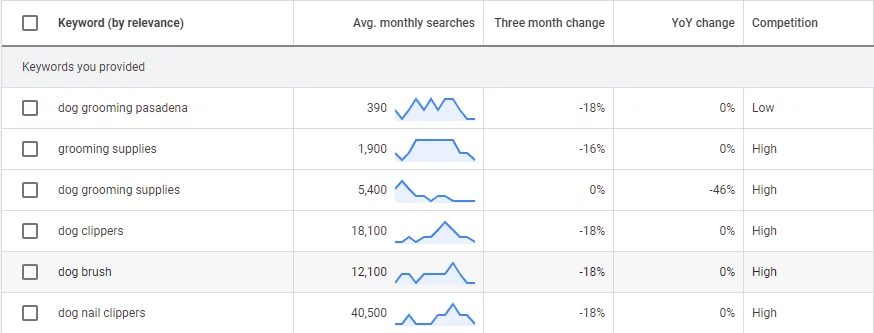
As you can see, ranking for big, broad keywords is much more competitive, making it more difficult and costly. You will have to compete with big companies like Amazon and Chewy if you are a small grooming supply business.
This means you need to have a strategic plan to succeed. Ranking for broad keywords may be more challenging than local ones, but it’s not impossible with the right national SEO services.
Website Structure And Design
Another difference between local SEO and national SEO is how you approach building and optimizing your site. Yes, this means that efforts to rank for national SEO involve more than changing your keyword targets.
When you want your website to rank high within a specific location, your site structure will be different than those looking to rank nationally (or globally).
For local SEO, your site may have a relatively simple structure with some service pages, an about us page, a location page, and a blog.
The real emphasis for local SEO is your business’s NAP: name, address, and phone number. Google uses this information for ranking local results, and it’s vital to have this information accurate.
With national SEO, on the other hand, your site structure might be a little more complicated.
Rather than focusing on one singular location, you might have subdirectories and subpages that target multiple locations within broader regions, such as an entire state or county.
For example, if your business serves five particular states, you will have location/service pages specific to each location.
Alternatively, online retailers selling to a national or global audience may not emphasize any location besides the basics. If your business is not specific to a certain area, your website design doesn’t need to reinforce your locality.
How To Improve Your National SEO Strategy
Now that you have a basic understanding of the differences between local and national SEO, it’s obvious that the latter is a more challenging feat.
However, to grow your business nationally and improve your ranking, you must begin investing in a national SEO strategy. This is the best direction to take for growing your business.
Here are the tips you should follow so your business can grow with national SEO services.
1.) Ensure Your Website is National SEO-Friendly
With all this talk about national SEO, let’s first make sure that your website is SEO-friendly, to begin with. Otherwise, making other changes will not significantly impact your website’s success.
SEO Site Structure
We already touched upon site structure a little bit, but it needs to be emphasized: structure matters. Your website structure needs to be built so that Google can find, crawl, index, and cache your pages.
While our website content is for humans, we must ensure it’s Google-friendly. Why? Because we need Google (and other search engines) if we want people to find our content. Especially if you want your content found on a national level.
When building a national SEO-friendly site, you want it to have a well-thought-out site architecture.
All of your pages and content should be easy to find by users and bots. Page hierarchy is important and should also be clear to search engines. Utilizing internal links will help clarify the hierarchy of your pages.
Meta Titles And Descriptions
When ensuring your website is optimized, you need to look at every page’s meta titles and descriptions. Meta data is important for SEO because it is displayed on the SERPs.
The quality of your meta titles and descriptions can impact your CTR and help communicate trust to search engines. To craft the ideal meta titles and descriptions, you should focus on length and keywords.
Technical SEO
When it comes to your website, technical SEO is one of the most important optimizations you can make. In a nutshell, this process involves identifying and correcting problems within your website’s structure.
See? I told you your site’s structure is important.
Technical SEO typically involves running regular audits on your website to look for errors and resolve as many as possible.
When checking the health of your website, you want to look at your website security, sitemaps, speed, internal and external links, and image alt texts. It’s also important to check for duplicate content, as that can affect your ranking.

2.) Conduct Keyword Research
Proper keyword research is critical to a successful national SEO strategy, which is why we’ll delve a little further into the topic.
When crafting content for your web pages or blogs, you want to write content that people are looking for and content that people want to read. Keyword research helps with that.
One way to begin your national SEO keyword research is to use the tools already at your disposal: Google Search Console, Google Analytics, your Google Business Profile, and your search term reports from Google Ads. All these tools can tell you how your website is performing and how people are finding your website.
These tools present keyword opportunities based on how your website is performing and what terms people are searching to find it. In Search Console, for example, you can view the performance of your website and its pages to see your top queries.
If you see keywords with high impressions but low clicks, you should consider optimizing those pages, especially if you are not using the keywords people are searching for to find your site.
You can also use tools like Semrush and Ahrefs to conduct keyword research.
Another method for conducting keyword research is to study your competitors. Analyzing the keywords they are using and the type of content they are writing can help guide your strategy.
When it comes time to pick keywords, there’s a lot more thought behind the process besides what sounds right. Here are things you need to consider when choosing keywords for your national SEO strategy.
Broad VS. Long-Tail Keywords
We already discussed how local SEO strategies rely on more specific, long-tail keywords, but they can also be used for national SEO, just in a different way.
Rather than getting specific about location, however, you can get more specific about the products, their use, or the user.
Let’s say you make and sell dog collars on the internet. There are various keywords you can use on your site.
The term dog collars is an obvious choice, but is it a good idea? Is that too broad?
Google tells me that dog collars has an average monthly search volume of 135,000, and it’s a competitive keyword. Let’s take a look at some other options to consider.

Dog collars is a broad keyword. There are various types and styles of dog collars to compete with, so we can find a better keyword.
A more specific keyword like “studded leather dog collar” is a better choice because it gives you a more qualified audience.
The more specific we get, the lower the search volume which means, as you might remember, less competition.
You will not be competing with nylon dog collars or flea collars, and users searching for this term are likely looking to make a purchase.
User Intent
Now that you know how to find keyword ideas, the intent is important for an SEO strategy.
Google wants to deliver relevant results. And as a business owner looking to improve SEO, you need to care about that, too.
If you’re looking to sell products, you want to craft your content using keywords your audience uses to buy. In most cases, you want your keywords’ intent to be more transactional or commercial rather than purely informational.
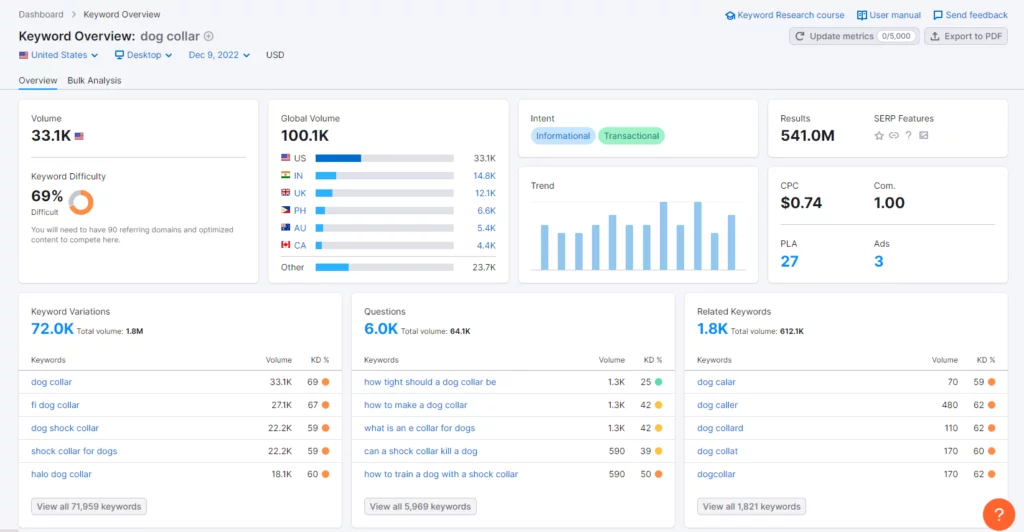
As we know from above, the keyword dog collars is informational and transactional. When we look at the SERPs, we get a combination of product pages and articles about the best dog collars.
So, not only are you competing with Chewy and Petco, but you are also competing with websites like Forbes and HGTV that have roundup posts.
A more specific example (leather studded dog collars) is a commercial keyword with search results featuring all retail products. For a product page, that is the keyword you are looking for.
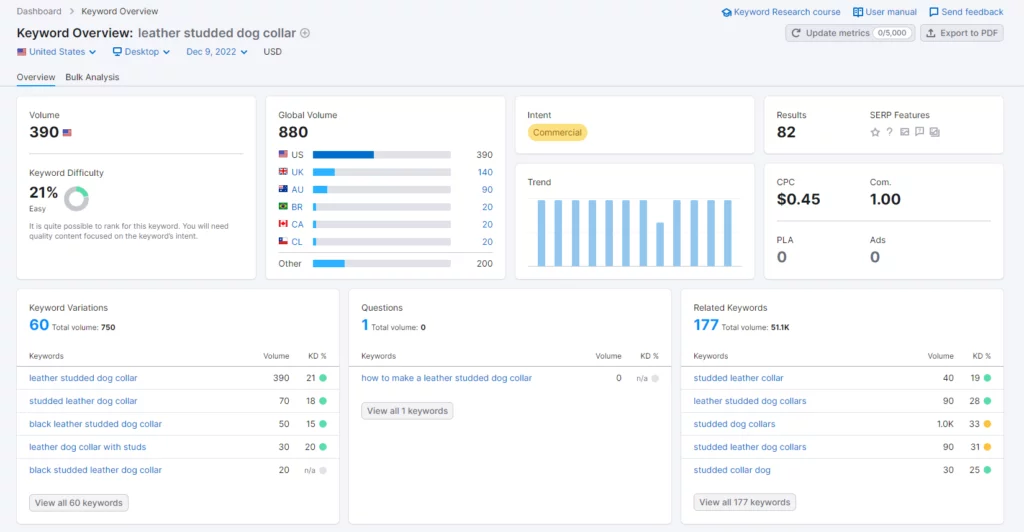
3.) Create Authoritative Content
Content marketing is still king, and valuable content has everything to do with good SEO. The best way to rank nationally is to create content that Google (and other search engines) finds valuable.
To devise content, look at what is already out there and improve upon it. Take the topic ideas you found your competitors using during your keyword/topic research phase and improve them.
Creating valuable content topics doesn’t have to be difficult. Google will give you great suggestions if you know where to look.
Let’s say you want to write your next blog post and need some topic ideas. Two easy ways to do that are using the SERPs or a keyword tool like Semrush.
To continue with the same example, if we search dog collars, we can use the People Also Ask feature for possible post topics. Since these questions appear high in the SERPs, we know they are relevant questions our potential audience is already asking.
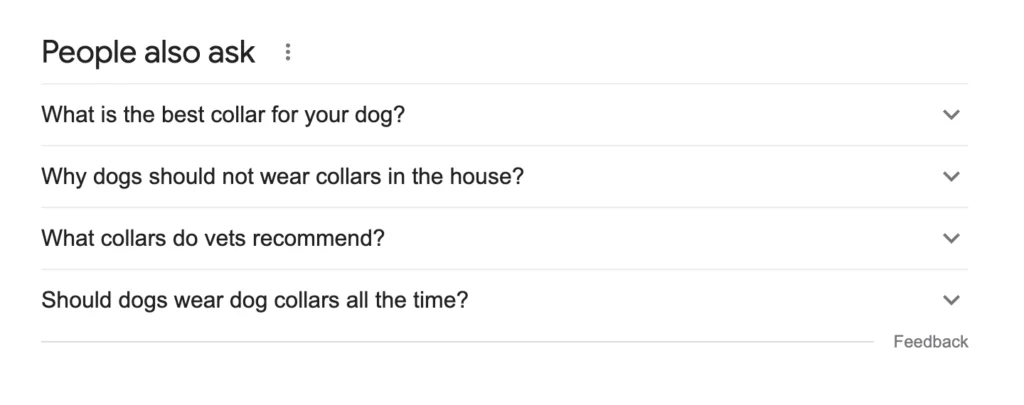
“Should dogs wear collars all the time?” may be a great question on a FAQ page, while “Which collars are most comfortable for dogs?” may be good for a blog post highlighting the most comfortable collars available in your shop.
When we search the same keyword in Semrush, we can look at keyword variations, questions, and related keywords for additional ideas.
Most national SEO companies will tell you that bigger is better when writing content.
The best-performing pieces of content are indeed longer (think 1,500 words and up vs. 600 words). However, quality is always going to matter more than quantity.
If you write a 2,000-word blog post that is almost entirely filler with keyword stuffing, it will not benefit you nearly as much as a shorter piece of content that is highly valuable to the user.
Remember: even though Google is a machine that crawls your site and ranks your pages, you always have to write your content with the human user in mind.
Google is neither for nor against your business. They are a neutral party with a job to deliver relevant results to those performing internet searches.
Google wants to rank the best content. At the end of the day, it could be your content or your competitor’s content.
The best way to ensure your content ranks nationally is to follow all the SEO guidelines and create valuable content that supports you as an authority in your field.
Let’s not forget that appearing in the top ten organic search results is not the only way to get to the front page of google. Conduct a SERP analysis of relevant keywords and use that information to create relevant content that Google will view as valuable to its users.
4.) Build Links To Your Website
Did you know that backlinks are one of Google’s ranking factors?
Link building is a valuable off-page SEO tool for national SEO strategies because it helps promote your content across different channels.
Having valuable content is great. Having that content be read and shared is even better.
One way to promote your content and website is through backlinks. This process involves reaching out to various journalists, publishers, bloggers, and other people within your industry who might be interested in linking to your website.
The key is to get backlinks from relevant and authoritative sources. You want Google to see these links as factors of relevancy. Google sees a bunch of relevant websites linking to your content, it’s going to assume it’s useful stuff.
You can learn more about why backlinks are crucial in our 2023 guide to link building. For now, let’s look at some actionable items you can do to improve your national SEO.
Share Original Infographics
At LSEO, we always talk about the importance of interactive content. Not only does it look better on your website and increase user engagement, but it can also be a valuable tool for getting links back to your website.
Infographics, in particular, are a very shareable type of content. They contain valuable information in an easily-digestible format (a graphic), which makes them incredibly popular among internet users.
When you create a visually-appealing infographic with valuable statistics, more users are likely to share that information. Be sure to create an embed code and share that everywhere, especially on social media. Encourage your followers to share it, as well.
Guest Post
Guest posting is an oldie but a goodie as long as you approach it the right way.
In a nutshell, guest posting creates amazing content for a website in your industry. Relevancy is key here: stick to websites that are relevant to your own. Then, you reach out to websites with healthy traffic and domain authority and ask them to post it for a backlink to you.
The theory is that guest posting is a mutually beneficial partnership: they get a valuable piece of content for their website, and you get a valuable backlink.
Utilize HARO
HARO, or Help a Reporter Out, is a platform where journalists ask questions for their stories and get quotes from experts in that field. They will link to your website if they quote you in their story.
HARO is a good way to get backlinks and further your authority within your field.
You can employ these link-building strategies to grow your business with national SEO.
Should You Invest In A National SEO Strategy? We Can Help!
Businesses need to focus on their online presence more now than ever before. To compete nationally, you must invest in a long-term national SEO strategy.
At LSEO, we are a national SEO company that can help your business grow with our enterprise SEO services. Contact us today for more information on what we can do to increase your website’s visibility and performance. We look forward to working with you!


